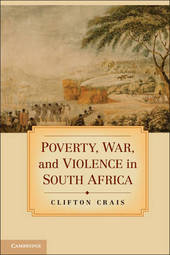
|
Poverty, War, and Violence in South Africa
Hardback
Main Details
| Title |
Poverty, War, and Violence in South Africa
|
| Authors and Contributors |
By (author) Clifton Crais
|
| Physical Properties |
| Format:Hardback | | Pages:200 | | Dimensions(mm): Height 235,Width 156 |
|
| Category/Genre | African history |
|---|
| ISBN/Barcode |
9781107013612
|
| Classifications | Dewey:968 |
|---|
| Audience | | Professional & Vocational | |
|---|
| Illustrations |
1 Tables, unspecified; 4 Maps; 3 Halftones, unspecified
|
|
Publishing Details |
| Publisher |
Cambridge University Press
|
| Imprint |
Cambridge University Press
|
| Publication Date |
19 September 2011 |
| Publication Country |
United Kingdom
|
Description
Poverty and violence are issues of global importance. In Poverty, War, and Violence in South Africa, Clifton Crais explores the relationship between colonial conquest and the making of South Africa's rural poor. Based on a wealth of archival sources, this detailed history changes our understanding of the origins of the gut-wrenching poverty that characterizes rural areas today. Crais shifts attention away from general models of economic change and focuses on the enduring implications of violence in shaping South Africa's past and present. Crais details the devastation wrought by European forces and their African auxiliaries. Their violence led to wanton bloodshed, large-scale destruction of property, and famine. Crais explores how the survivors struggled to remake their lives, including the adoption of new crops, and the world of inequality and vulnerability colonial violence bequeathed. He concludes with a discussion of contemporary challenges and the threats to democracy in South Africa.
Author Biography
Clifton Crais is Professor of History and Director of the Institute of African Studies at Emory University. He is author of over one hundred works, including Sara Baartman and the Hottentot Venus: A Ghost Story and a Biography (2008) - on the woman more famously known as the 'Hottentot Venus' and the subject of a feature film, 'Venus Noire' - The Politics of Evil: Magic, Power and the Political Imagination in South Africa (Cambridge University Press, 2002) and White Supremacy and Black Resistance in Pre-Industrial South Africa: The Making of the Colonial Order in the Eastern Cape, 1770-1865 (Cambridge University Press, 1992). He is also editor of The Culture of Power in Southern Africa: Essays on State Formation and the Political Imagination (2003), co-editor of Breaking the Chains: Slavery and its Legacy in Nineteenth-Century South Africa (1995) and Area Editor of the Encyclopedia of World History (8 volumes, 2008). Crais is nearing completion of History Lessons, a work that combines memoir, historiography and the neuroscience of memory, and a documentary history of South Africa. Long-range works include a history of violence and explorations of fiction and creative non-fiction concerning memory and narrative.
Reviews'With brisk economy, this book provides a fresh and compelling explanation of the origins of rural poverty in nineteenth-century South Africa. It is indispensable reading for anyone who is seriously interested in understanding the persistence of crushing poverty in the South African countryside today.' Ivan Evans, University of California, San Diego 'South Africa is marked by extreme income inequality and crushing rural poverty. In this challenging and original work, Professor Clifton Crais reorients South African historiography, pointing squarely to the searing violence of colonial conquest - well before the mineral revolution or the rise of the apartheid state - as the root of poverty in South Africa's Eastern Cape. Though the argument is built on a close study of this one region, it has important implications for our understanding of the history of poverty and inequality across much of Africa. This thoughtful work, which looks closely at the consequences of conquest from the miseries of maize to the insecurity of land tenure, is sure to stimulate a lively debate.' Thomas McClendon, Southwestern University 'This work could be a watershed in South African historiography: it dispenses with some key orthodoxies in the established literature on the origins of modern South Africa and opens new perspectives on current concerns with enduring rural poverty and social inequalities.' Andre du Toit, University of Cape Town '... all readers will find food for thought in this innovative and beautifully written study.' Norman Etherington, Journal of African History
|